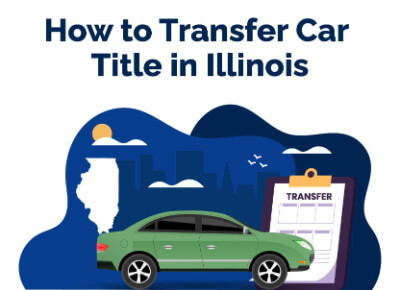How To Transfer Car Title in Illinois
March 8, 2024


Chris is Head of Content for FindTheBestCarPrice and is based out of Philadelphia, PA. As a seasoned automotive industry analyst and car enthusiast, he ensures the highest level of quality across all our content and curates our picks for the best deals each month.
Chris studied information systems and marketing at Drexel University and writes about a wide range of topics ranging from car buying tips to troubleshooting common mechanical issues.
When he’s not thinking about cars, he likes to stay in with his dog and make an “attempt” to finish a crossword puzzle (he’s not quite at the Saturday/Sunday level…yet). As a former cheesemonger, Chris still has a “sharp” passion for all things cheese, and his fridge is always loaded with it!
Chris also has a passion for things that go fast, and drones are no exception. He spends some of his time writing for Dronesourced.
Are you a Chicago resident looking to ditch your car and embrace public transportation? Or perhaps you're an Illinois suburbanite in need of a new vehicle? Whatever your situation, if you're changing ownership of a car in Illinois, you'll need to perform a car title transfer.
A certificate of title (COT) serves as proof of car ownership, and transferring the title is a crucial aspect of buying or selling a pre-owned vehicle in Illinois.
But it's not just about buying and selling - you'll need a title in your name to establish car ownership, whether you're gifting a car to a friend or family member, receiving a vehicle through inheritance, or any other scenario.
Let’s look at everything you need to know about how to transfer a car title in Illinois so that you can navigate the process with confidence and ease.
Table of Contents
- Key Takeaways
- Emissions Testing in Illinois
- How To Transfer Car Title in Illinois If You're Selling
- How To Transfer Car Title in Illinois If You're the Buyer
- How To Transfer Car Title in Illinois If You Have an Out-of-State Title
- How To Transfer Car Title in Illinois When the Owner Dies
- Gifting Family Member Cars
- Title Transfer Cost in Illinois
- Requesting a Replacement Car Title in Illinois
- Bill of Sale
- Conclusion
- Best Car Deals by Category
- Frequently Asked Questions
Key Takeaways
- If selling a car in Illinois, fill out the title's "Assignment of Title" section and remove your plates
- Buyers need to submit the completed title and other documents to the state office
- If you're new to Illinois and have a car from another state, you need to get an Illinois title and register your car within 30 days
Emissions Testing in Illinois
Illinois doesn't mandate statewide emissions testing. However, the following counties require it:
- Will
- St. Clair
- Monroe
- Madison
- McHenry
- Kendall
- Kane
- Lake
- Dupage
- Cook
It's worth noting that not all vehicles in these counties are subjected to inspections.
Passenger vehicles under four years old, produced before 1996, or utilized for agricultural purposes are exempt from emissions inspections.
How To Transfer Car Title in Illinois If You're Selling
If you're selling your vehicle privately, you must:
- Fill out the "Assignment of Title" section, comprising the odometer reading, date of sale, buyer's name, and your signature, and give it to the purchaser.
- Detach the license plates from the car before transferring them to the buyer. You may be eligible to transfer the plates to your new vehicle. You must complete a Seller's Report of Sale Form (Form VSD 703), relieving you of any vehicle responsibility.
Please be aware that if you lack the vehicle's title, you must petition for a replicated title to effectuate the vehicle's ownership transfer to the purchaser.
How To Transfer Car Title in Illinois If You're the Buyer
When you procure a vehicle from a dealership, the dealership is responsible for processing the vehicle title transfer and registration paperwork on your behalf.
However, in the case of private vehicle sales, the onus of initiating the vehicle title transfer process lies with you. The car title made available by the seller must include the following details:
The vehicle identification number (VIN)
The "Assignment of Title" section completed, which includes:
- The odometer reading
- The date of the purchase
- Your name
- The seller's signature
You will need to apply for the vehicle title transfer and vehicle registration by submitting the following documents and payment to your local IL SOS office:
- The vehicle's title
- The Application for Vehicle Transaction(s) Form (Form VSD 190) must be completed online.
- A completed Private Party Vehicle Tax Transaction Form (Form RUT-50) is exclusively available at IL SOS offices.
- Payment for the applicable Illinois taxes and fees.
How To Transfer Car Title in Illinois If You Have an Out-of-State Title
If you have recently established residency in Illinois, you must obtain an Illinois title and register your vehicle within 30 days.
To execute an Illinois car title transfer using an out-of-state title, you will need to provide the following documentation:
- An Application for Vehicle Transaction(s) (VSD-190)
- An Illinois address where you can be reached
- The mileage from the vehicle's odometer
- A comprehensive description of the vehicle, including its year, make, and model
- A list of any lienholders, if applicable
- The signature of the vehicle's owner
- Form RUT-25, along with the payment of any applicable taxes
If the vehicle is leased, additional documents that must be submitted include the following:
- The lease agreement
- The original out-of-state registration
- The current out-of-state title
- The Manufacturer's Certificate of Origin (MCO)
- A bill of sale
How To Transfer Car Title in Illinois When the Owner Dies
Transferring a vehicle to an heir after the owner's demise is contingent on whether the estate undergoes the legal proceedings of probate.
In the case of probate, the following documents will be needed:
- The car title
- Application for Vehicle Transaction(s) (VSD-190) with mileage
- Certified copies of either the letters of administration or testamentary that name the representative
- Form RUT-50 and payment of any applicable taxes
- Title fee of $155
Conversely, if you opt out of the probate procedure and the estate valuation is below $100,000, you may pursue the Small Estate Affidavit Procedure.
To fulfill the procedure, you will require the following documents:
- The Small Estate Affidavit
- The car title
- Copy of the death certificate
- Application for Vehicle Transaction(s) (VSD-190) with mileage
- Form RUT-50 and payment of any applicable taxes
- Title fee of $155
Gifting Family Member Cars
Transferring vehicle ownership to a family member as a gift is possible. This process requires following the standard vehicle title transfer procedure, except for the fee tax, which is a predetermined amount. The Illinois Secretary of State offices handle the vehicle title transfer process.
To initiate the process, you must obtain the VSD-190 vehicle title transfer form and the RUT-50 tax form.
These forms must be filled out before they can be accepted. You can obtain them personally at the Secretary of State offices or by phone at 800-252-8980.
Illinois residents must record the current odometer reading on the designated line of the vehicle title. The vehicle's current owner must sign the title, and their family member must sign as the new owner.
Verifying that the vehicle identification number (VIN) indicated on the title is similar to the one inscribed on the automobile is also crucial. The VIN can be located on the driver's side door.
To consummate the transfer, a personal visit to the Secretary of State's office is mandatory, where you must provide the essential documentation and remit the stipulated fees. These fees include a $95 title transfer fee and a $15 fee for a signed title.
Title Transfer Cost in Illinois
In Illinois, the vehicle title fees are payable upon transfer. The standard title fee in Illinois is $95. If you relocate from another state, you are granted a 30-day window to perform an official vehicle title transfer.
In situations where you have acquired a vehicle through inheritance or purchase, you must register the vehicle within 20 days of acquisition. And a required registration fee of $101 for a standard passenger vehicle.
You can also transfer your license plates by paying an additional fee of $25. If you need to make corrections to your Illinois vehicle title, such as changing ownership or removing an owner, there is a $15 fee for these revisions.
Requesting a Replacement Car Title in Illinois
If your vehicle title has been misplaced, you must secure a duplicate vehicle title, which can be procured by soliciting the Illinois Secretary of State (SOS) for a replacement.
The process for obtaining a duplicate Illinois vehicle title involves submitting several documents, including the Application for Vehicle Transaction(s) (Form VSD 190) and the vehicle's original title, if available. You will also be required to pay a duplicate vehicle title fee of $50.
Bill of Sale
Although a bill of sale is not mandatory when buying or selling a vehicle in Illinois, obtaining one as an official acknowledgment of the transfer is advisable.
A bill of sale offers legal protection for both parties, as it confirms that the seller is no longer linked to the vehicle and provides evidence of the buyer's ownership.
Conclusion
To transfer your vehicle title in Illinois, if selling, you'll need to fill out the "Assignment of Title" section of the form, comprising the odometer reading, date of sale, buyer's name, and your signature, and give it to the purchaser, who will then file it. You will have to pay a title fee of $155.
Best Car Deals by Category
Frequently Asked Questions
What is a vehicle title, and why must it be transferred to Illinois?
A vehicle title is a legal document proving a vehicle's ownership. Transferring it to Illinois when selling or purchasing a vehicle is essential to establish a new legal owner.
What are the documents required to transfer a vehicle title in Illinois?
To transfer a vehicle title in Illinois, you will need a properly filled-out Application for Vehicle Transaction(s) (Form VSD 190), the vehicle's original title, proof of insurance, and payment for the applicable fees.
Can I transfer a vehicle title online in Illinois?
The Illinois Secretary of State allows online vehicle title transfers through their online platform. However, certain conditions must be met, such as the vehicle not having any liens or loans attached.
How long does it take to transfer a vehicle title in Illinois?
Generally, receiving the new vehicle title takes about two to four weeks after the Illinois Secretary of State processes the application and payment.
Are there any special requirements for transferring a vehicle title to a family member in Illinois?
No, transferring a vehicle title to a family member in Illinois follows the same process as transferring to any other person. However, you may be exempt from some fees under specific circumstances, such as if the transfer is a gift or part of a divorce settlement.
Do I need to inspect the vehicle to transfer a title to Illinois?
Generally, no. However, in some cases, such as transferring a salvage title, the Illinois Secretary of State may require a vehicle inspection. Checking with the Secretary of State's office to determine if an inspection is necessary for your specific situation is often advised.
Posted in Car Buying Tips |




